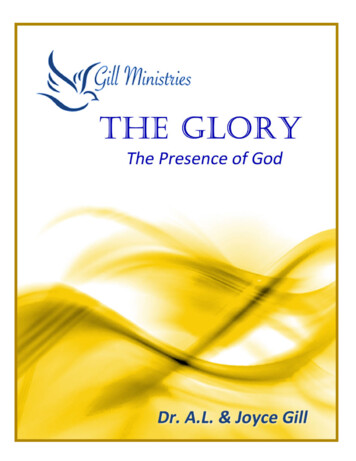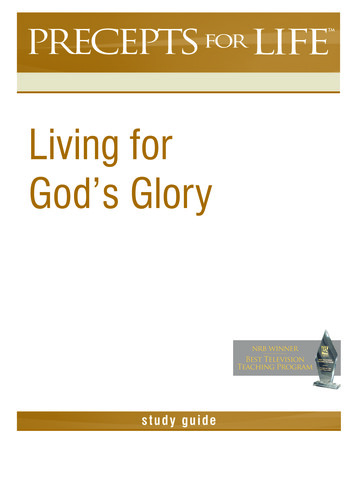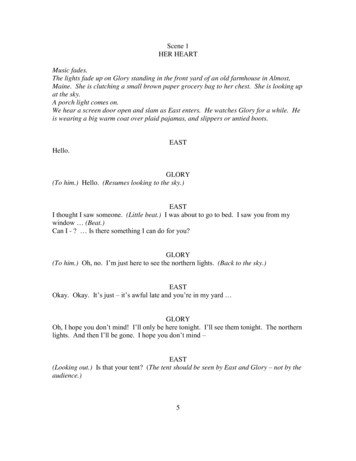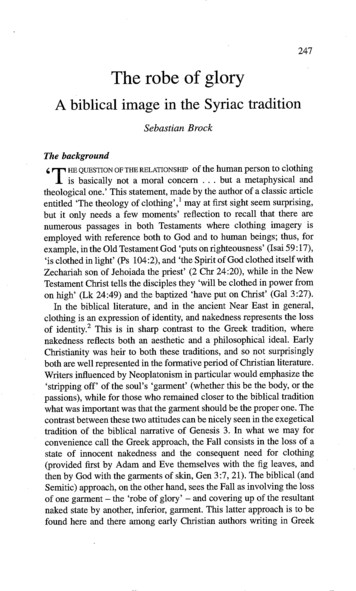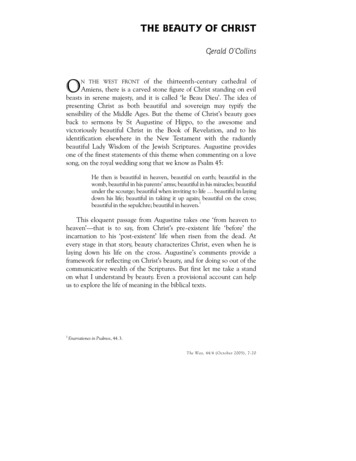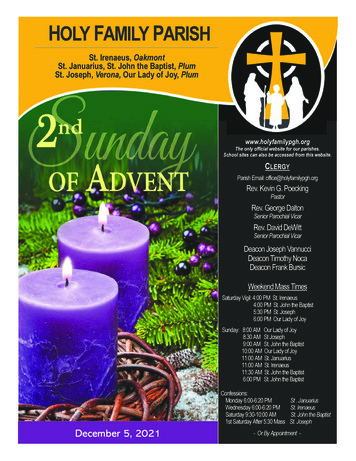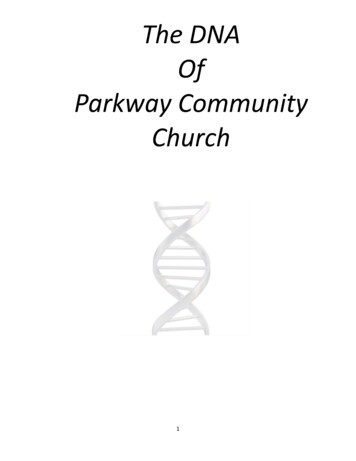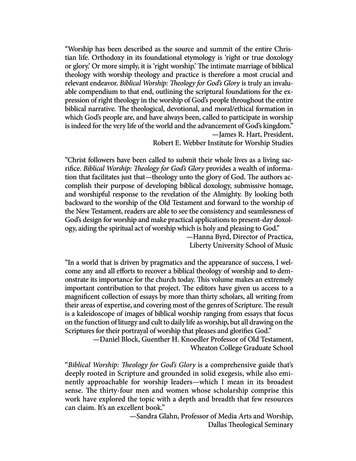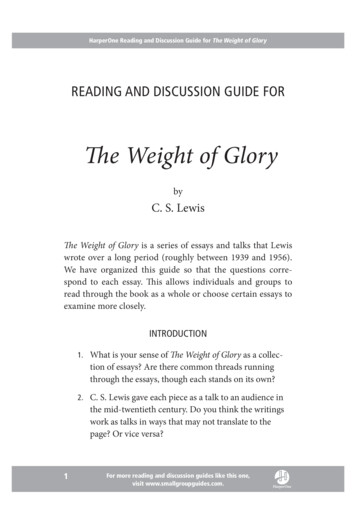
Transcription
HarperOne Reading and Discussion Guide for The Weight of GloryReading and Discussion Guide forThe Weight of GlorybyC. S. LewisThe Weight of Glory is a series of essays and talks that Lewiswrote over a long period (roughly between 1939 and 1956).We have organized this guide so that the questions correspond to each essay. This allows individuals and groups toread through the book as a whole or choose certain essays toexamine more closely.introduction1. What is your sense of The Weight of Glory as a collec-tion of essays? Are there common threads runningthrough the essays, though each stands on its own?2. C. S. Lewis gave each piece as a talk to an audience inthe mid-twentieth century. Do you think the writingswork as talks in ways that may not translate to thepage? Or vice versa?1For more reading and discussion guides like this one,visit www.smallgroupguides.com.
HarperOne Reading and Discussion Guide for The Weight of GloryChapter 1The Weight of Glory1. Have you thought of heaven as a bribe—that if you fol-low Christ it will pay off with everlasting bliss? Lewissays that as we follow Jesus, we understand that it’s nota bribe but a desire for heaven itself (p. 28). How hasyour attitude toward heaven changed through theyears?2. “If Christianity could tell me no more of the far-offland than my own temperament led me to surmisealready, then Christianity would be no higher thanmyself. If it has more to give me, I expect it to be lessimmediately attractive than ‘my own stuff ’ ” (pp.33–34). Do you struggle with the lack of informationthat scripture provides about heaven?3. There are five things we know of heaven: we will bewith Christ, be like him, have glory, enjoy a feast, andhave some sort of role to play. Lewis asks, “Why anyone of them except the first? Can anything be added tothe conception of being with Christ?” (p. 34). What doyou think? How would you answer Lewis’s question?4. Jesus says we need to be like little children to enter thekingdom of heaven. A little child seeks the praise of hisfather as the Christian seeks the praise of God. Wewant to be told, “Well done, faithful servant.” Lewisstruggles with this idea. He calls it the weight of glory,“to be loved by God, not merely pitied” (p. 39). Haveyou struggled with this simple truth? How does Lewis’s2For more reading and discussion guides like this one,visit www.smallgroupguides.com.
HarperOne Reading and Discussion Guide for The Weight of Glorydefinition of glory line up with what you understandthe meaning of glory to be?5. “You have never talked to a mere mortal,” Lewis writes.“It is immortals whom we joke with, work with, marry,snub, and exploit—immortal horrors or everlastingsplendours” (p. 46). Does that statement make youthink differently about what it means to interact withothers and, particularly, what it means to love yourneighbor?Chapter 2Learning in War-Time1. Lewis asks a question that he thinks we must continu-ally answer: “How can you be so frivolous and selfish asto think about anything but the salvation of souls?”Why do you think we busy ourselves with theoremsand arguments and the latest writings, as Lewis says(pp. 50–51)? Is it wrong to occupy our time with tasksthat don’t further God’s kingdom?2. What does Lewis mean when he says that “Christianitydoesn’t simply replace our natural life. . . . [I]t is rathera new organisation which exploits, to its own supernatural ends, these natural materials” (p. 54)? How haveyou struggled with this paradox: that we experience theseemingly “frivolous” activities of life along with thecall to do everything for the glory of God?3For more reading and discussion guides like this one,visit www.smallgroupguides.com.
HarperOne Reading and Discussion Guide for The Weight of GloryChapter 3Why I Am Not a Pacifist1. At the beginning of the chapter, Lewis says that thedecision to fight or walk away actually asks a more general question: “How do we decide what is good orevil?” Do you think Lewis sufficiently answers thisquestion in the chapter?2. Lewis gives his rationale for why he is not a pacifist. Hesays there are some people who are so corrupted thatthey do not love or want happiness but prefer hatredand misery (p. 69). He certainly doesn’t claim that violence is agreeable, but for Lewis, one cannot say thatwar always does more harm than good (pp. 72–73).Rather, he works through judgment, intuition, history,and authority to qualify what turning the cheek reallymeans for an individual and for a nation (pp. 84–90).Do you agree with Lewis’s rationale? How does yourunderstanding of the Bible and Christian faith influence your feelings toward war?Chapter 4Transposition1. There are moments, as Lewis references in the firstchapter, when we glimpse the glory of God—in nature,in our relationships with people, or in church participation. In these moments, we might be briefly transposed to see beyond what we might otherwise see. But4For more reading and discussion guides like this one,visit www.smallgroupguides.com.
HarperOne Reading and Discussion Guide for The Weight of Gloryoften we shy away. Have you dared to be a person whois sensitive to the work of God, as Lewis discusses inthis chapter? Are there any examples of these “transposed” moments in your life?Chapter 5Is Theology Poetry?1. Does Christian theology owe its attraction to its powerof arousing and satisfying our imaginations (p. 117)?Lewis points to the necessity of imagination as a toolwe use in faith, but the mythology is not the goal. Howhas imagination helped you solidify the truth of yourfaith?Chapter 6The Inner Ring1. “Of all passions the passion for the Inner Ring is mostskillful in making a man who is not yet a very bad mando very bad things” (p. 154). Do you agree or disagree?How can this be avoided?2. What is the problem with an “Inner Ring,” as Lewiscalls it—a group that includes some people whileexcluding others—especially in relation to faith andscripture, which tells us, “Seek and find; ask and it’ll beopened” (p. 157)?5For more reading and discussion guides like this one,visit www.smallgroupguides.com.
HarperOne Reading and Discussion Guide for The Weight of GloryChapter 7Membership1. Scripture says that the church is the bride of Christ.Lewis says that means we are members of one another(p. 158), thus pointing to the inadequacy of a privatereligious life. What are your struggles with beinginvolved in a church community? Do you agree withLewis’s interpretation of this communal necessity?2. Lewis says, “The very word membership is of a Chris-tian origin, but it has been taken over by the world andemptied of meaning. . . . By members [Paul] meantwhat we should call organs, things essentially differentfrom, and complementary to, one another” (pp. 163–64). How is this different from the popular idea ofmembership, and how should a church reflect thisstronger definition in its community?3. How does Lewis reanalyze the idea that we are all equalin the eyes of God (p. 167)? Do you agree with him?Chapter 8On Forgiveness1. Do you believe in the forgiveness of sins (p. 177)?Lewis felt this question had a simple answer for theChristian, but he soon realized that “to believe in theforgiveness of sins is not nearly so easy as I thought.”Why not? Do you agree?6For more reading and discussion guides like this one,visit www.smallgroupguides.com.
HarperOne Reading and Discussion Guide for The Weight of Glory2. When you ask God to forgive you, are you sometimesasking God to excuse you (p. 178)?3. Do you find it hard to forgive the “incessant provoca-tions of daily life”? Lewis defines it as continuing to forgive “the bossy mother-in-law, the bullying husband,the nagging wife, the selfish daughter, the deceitful son”(p. 182). Does it help to remember that we ourselvesstand in need of grace?Chapter 9A Slip of the Tongue1. When you enter into daily prayer or attend churchservices, do you sometimes experience what Lewisdescribes as the voice inside you that says not to get tooclose in case you’re asked to do something quite inconvenient (p. 185)? How does understanding the “weightof glory” and what it means to be loved by God alterour expectations that he will move and change us?7For more reading and discussion guides like this one,visit www.smallgroupguides.com.
HarperOne Reading and Discussion Guide for The Weight of Glory For more reading and discussion guides like this one, visit www.smallgroupguides.com. 1 The Weight of Glory by C. S. Lewis The Weight of Glory is a series of essays and talks that Lewis
